

They say that thought is another dimension. The brain portals its way to elusive and ethereal places – pieced by segments and glimpses and fleeting instances of memory and scene and feeling and emotion and amalgamated into something higher: the mind. This team was created as an attempt to understand the visible physical elements of processing, reasoning, chemical composition (etc..) and how it creates and perceives the abstruse mind. The Human Brain. Biology - Brain Brain Waves When you drop a small stone in water, you see waves.
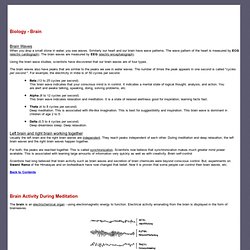
Similarly our heart and our brain have wave patterns. The wave pattern of the heart is measured by ECG (electro cardiograph). The brain waves are measured by EEG (electro encephalograph). Using the brain wave studies, scientists have discovered that our brain waves are of four types. Rewriting the Mind – We Are What We Think - Evolving Beings. The conscious mind is the part we are aware of – the part that does the thinking, worrying, planning and creating.
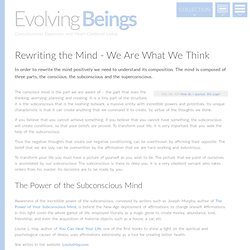
It is a tiny part of the structure; it is the subconscious that is the looming bulwark, a massive entity with incredible powers and potentials. Its unique characteristic is that it can create anything that we command it to create, by virtue of the thoughts we think. If you believe that you cannot achieve something, if you believe that you cannot have something, the subconscious will create conditions, so that your beliefs are proved. To transform your life, it is very important that you seek the help of the subconscious. Brain Mind Lecture 1: Lobes of the Brain, Limbic System, Language, Consciousness. - Technology & science. Possibilianism. Welcome to the Possibilium. Neuroscience of Music - How Music Enhances Learning - Neuroplasticity. Neuroscience research into the neuroscience of music shows that musicians’ brains may be primed to distinguish meaningful sensory information from noise.

This ability seems to enhance other cognitive abilities such as learning, language, memory and neuroplasticity of various brain areas. Scientific review of how music training primes nervous system and boosts learning Those ubiquitous wires connecting listeners to you-name-the-sounds from invisible MP3 players, whether of Bach, Miles Davis or, more likely today, Lady Gaga, only hint at music’s effect on the soul throughout the ages.
Now a data-driven review by Northwestern University researchers that will be published July 20 in Nature Reviews Neuroscience pulls together converging research from the scientific literature linking musical training to learning that spills over to skills including language, speech, memory, attention and even vocal emotion. Contact: Pat Vaughan Tremmel Source: Northwestern University.
"Test-tube" brain. Is the Internet Warping Our Brains? - Technology. Is this a bad thing?
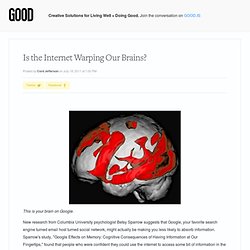
Not necessarily, says Sparrow. An afternoon nap markedly boosts the brain’s learning capacity. If you see a student dozing in the library or a co-worker catching 40 winks in her cubicle, don’t roll your eyes.

New research from the University of California, Berkeley, shows that an hour’s nap can dramatically boost and restore your brain power. Indeed, the findings suggest that a biphasic sleep schedule not only refreshes the mind, but can make you smarter. Untitled Page. Allen Brain Atlas: Mouse Brain. Allen Institute for Brain Science - Welcome. The Brain's Dark Energy. Imagine you are almost dozing in a lounge chair outside, with a magazine on your lap.
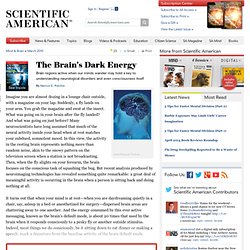
Suddenly, a fly lands on your arm. You grab the magazine and swat at the insect. What was going on in your brain after the fly landed? And what was going on just before? Many neuroscientists have long assumed that much of the neural activity inside your head when at rest matches your subdued, somnolent mood. Neuroscience. Mind and Brain. How to increase serotonin in the human brain without drugs. The Brain-Information about the Brain. 1 Introduction “I think, therefore I am.”

—René Descartes, 17th-century philosopher Few of us question the crucial importance of the brain. It is vital to our existence. Our brains enable us to think, as René Descartes so skillfully pointed out nearly 400 years ago. The brain makes up only 2 percent of our body weight, but it consumes 20 percent of the oxygen we breathe and 20 percent of the energy we consume. Scientists have worked for many years to unravel the complex workings of the brain.
Despite these and other significant advances in the field of brain research, most of the processes responsible for the integrated functioning of billions of brain cells remain a mystery. Neuron.jpg from sciencecodex.com. 5 Ways To Hack Your Brain Into Awesomeness. Much of the brain is still mysterious to modern science, possibly because modern science itself is using brains to analyze it.

There are probably secrets the brain simply doesn't want us to know. But by no means should that stop us from tinkering around in there, using somewhat questionable and possibly dangerous techniques to make our brains do what we want. What cannabis actually does to your brain - io9. Chances are they would've ended up brainless morons with or without the pot.
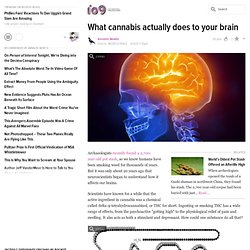
It's quite frankly not strong enough of a narcotic to destroy one's life such as you describe. It's very dependent on the user's persona. @Tadashii: Are you also for alcohol and tobacco prohibition? Those ruin more lives every year then marijuana has ever. Mouse Party. Mind-reading scan identifies simple thoughts - health - 26 May 2011. A new new brain imaging system that can identify a subject's simple thoughts may lead to clearer diagnoses for Alzheimer's disease or schizophrenia – as well as possibly paving the way for reading people's minds.
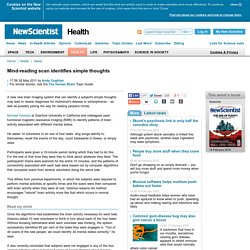
Michael Greicius at Stanford University in California and colleagues used functional magnetic resonance imaging (fMRI) to identify patterns of brain activity associated with different mental states. He asked 14 volunteers to do one of four tasks: sing songs silently to themselves; recall the events of the day; count backwards in threes; or simply relax. You won't find consciousness in the brain - opinion - 07 January 2010. What is Consciousness? The end is always nigh in the human mind - opinion - 07 June 2011. Neuroscience. Neurology. Neuroscience. List of cognitive biases. Cognitive biases are tendencies to think in certain ways that can lead to systematic deviations from a standard of rationality or good judgment, and are often studied in psychology and behavioral economics. There are also controversies over some of these biases as to whether they count as useless or irrational, or whether they result in useful attitudes or behavior.
For example, when getting to know others, people tend to ask leading questions which seem biased towards confirming their assumptions about the person. BRAINMETA.COM - NEUROSCIENCE, CONSCIOUSNESS, BRAIN, MIND, MIND-BRAIN, NEUROINFORMATICS, BRAIN MAPS, BRAIN ATLASES. Cognitive dissonance. In psychology, cognitive dissonance is the mental stress or discomfort experienced by an individual who holds two or more contradictory beliefs, ideas, or values at the same time, or is confronted by new information that conflicts with existing beliefs, ideas, or values.[1][2] Leon Festinger's theory of cognitive dissonance focuses on how humans strive for internal consistency.
When inconsistency (dissonance) is experienced, individuals tend to become psychologically uncomfortable and they are motivated to attempt to reduce this dissonance, as well as actively avoiding situations and information which are likely to increase it.[1] Relationship between cognitions[edit] Individuals can adjust their attitudes or actions in various ways. Synesthesia. How someone with synesthesia might perceive (not "see") certain letters and numbers. Synesthetes see characters just as others do (in whichever color actually displayed), yet simultaneously perceive colors as associated to each one.
Synesthesia (also spelled synæsthesia or synaesthesia; from the Ancient Greek σύν syn, "together", and αἴσθησις aisthēsis, "sensation") is a neurological phenomenon in which stimulation of one sensory or cognitive pathway leads to automatic, involuntary experiences in a second sensory or cognitive pathway.[1][2][3][4] People who report such experiences are known as synesthetes. Rare but Real: People Who Feel, Taste and Hear Color.
When Ingrid Carey says she feels colors, she does not mean she sees red, or feels blue, or is green with envy. She really does feel them. Brain-Machine. The Brain! Brain. Brain. Anatomy of the brain. Brain mechanism recruited to reduce noise during challenging tasks. New research reveals a sophisticated brain mechanism that is critical for filtering out irrelevant signals during demanding cognitive tasks. The study, published by Cell Press in the February 26 issue of the journal Neuron, also provides some insight into how disruption of key inhibitory pathways may contribute to schizophrenia. "The ability to keep track of information and one's actions from moment to moment is necessary to accomplish even the simple tasks of everyday life," explains senior study author, Dr. Helen Barbas from Boston University and School of Medicine. "Equally important is the ability to focus on relevant information and ignore noise.
" Dr. "The primate dorsolateral prefrontal cortex (DLPFC) and anterior cingulated cortex (ACC) are brain regions that focus attention on relevant signals and suppress noise in cognitive tasks. The authors conclude that ACC pathways may help reduce noise by stimulating inhibitory neurons in DLPFC. Source: Cell Press. Mind and Memory.